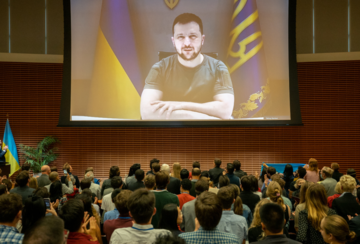News

U.S.-Russia relations, one year after Geneva
U.S.-Russia relations, one year after Geneva
The June 16, 2021 meeting in Geneva between U.S. President Joe Biden and Russian President Vladimir Putin gave a positive impulse to a bilateral U.S.-Russia relationship that was plumbing post-Cold War depths. Both sides made modest progress in the following months, only to be wholly derailed by Putin’s war of choice against Ukraine. It will be a long time before the U.S.-Russia relationship can approach anything that resembles “normal.”

Deciphering China’s intentions is a pressing task for U.S. scholars and policymakers, yet there is a lack of consensus about what China plans to accomplish. In a new study that reviews the existing English and Chinese language literature on intentions and revisionism, Center Fellow Oriana Skylar Mastro offers five propositions to allow for a more productive and data-driven approach to understanding Beijing’s intentions.

The Program on Arab Reform and Democracy (ARD) at CDDRL is pleased to announce the release of the May 2022 issue of Mofeed Digest, a periodic recap of the most important scholarly and policy publications, reports, and articles investigating the impact of the COVID-19 pandemic on the politics, economies, and societies of the Arab world.

After two years of online ceremonies due to the pandemic, the Ford Dorsey Master’s in International Policy program celebrated with a fully in-person graduation ceremony for the 2022 graduating class.

Congratulations to the ten student honorees from Hiroshima Prefecture, Kawasaki City, Kobe City, Oita Prefecture, and Tottori Prefecture.
Stanford Medicine's Jason Wang and Michele Barry sit on an expert committee of the National Academies examining ways the CDC's national quarantine network can better prepare for the next pandemic.

The inaugural conference of APARC's South Asia Initiative convened experts from the public and private sectors to examine the role that critical and emerging technologies can play in India’s national security and generate new pathways for U.S.-India cooperation.

Maria Clara Rodrigues worked with SHP's Grant Miller at the Stanford Human Trafficking Data Lab to uncover ways in which politically connected predators of human trafficking often avoid punishment.

Three weeks before Russian troops invaded Ukraine, China and Russia announced that their 2019 “Comprehensive Strategic Partnership of Coordination in a New Era” had been upgraded to a “friendship without limits.” Chinese, Russian, and third country commentators used even more inflated rhetoric to describe the relationship and predict its implications for the United States, the liberal order, and Taiwan. APARC’s 2022 Oksenberg Conference examined the origins, objectives, and implications of the much-vaunted relationship.

During a period of greater hope for Russia tempered by uncertainties, President Bill Clinton sought both to enlarge NATO and build a strategic partnership between the Alliance and Moscow.

As the 2022 cohort of Master’s in International Policy students prepares to graduate, four classmates — Sylvie Ashford, David Sprauge, Shirin Kashani, and Mikk Raud — reflect on their experiences being part of the FSI community.

Departing from international relations scholarship and popular media accounts that tend to portray China as a great power intent on establishing a sphere of influence in Southeast Asia, Lee Kong Chian NUS-Stanford Fellow on Southeast Asia Enze Han argues for conceptualizing China as an unconventional great power whose diverse actors, particularly non-state ones, impact its influence in the region.

Adrian Scheibler ('22) is a recipient of the 2022 Firestone Medal and Michal Skreta ('22) has won the CDDRL Outstanding Thesis Award.

Network experts, including Herb Lin, say the U.S. is just as vulnerable – or even more vulnerable – to cyber attacks.

Every year, a few hundred idealistic, nerdy college students compete in the Intercollegiate Ethics Bowl.

In 1999 Nina Tannenwald, a political scientist at Brown University, wrote a paper analyzing something she had observed among generals, politicians and strategists: the “nuclear taboo”.

On June 1, 1996, two trains arrived in Russia transporting the last nuclear warheads that had been deployed in Ukraine when the Soviet Union collapsed.

Ukraine’s President Volodymyr Zelenskyy spoke to the Stanford community in a special video address about his country’s war against Russia for independence, freedom, and global democracy, which he said requires the continued support of all the people of the free world.

It is difficult to anticipate how the geopolitical storm set off by Russia’s invasion of Ukraine may develop. What is certain is that the international order will not be the same, and this change will have significant repercussions for South Korea.

New analysis shows crop yields could increase by about 25% in China and up to 10% in other parts of the world if emissions of a common air pollutant decreased by about half.
Gab was founded in 2016 as an uncensored alternative to mainstream social media platforms. Stanford Internet Observatory’s latest report looks at behaviors and dynamics across the platform.

Stanford Global Studies hosts Education Partnership for Internationalizing Curriculum (EPIC) Symposium.

Many will applaud Mr. Biden for standing up for democratic Taiwan in the face of Chinese threats. But he could be putting the island in greater danger, and the United States may not be able to come to the rescue.
Maya Rossin-Slater and colleagues write in The Conversation that their research shows survivors of school shootings like the one in Uvalde, Texas, suffer long-term health, economic and financial burdens from their trauma.




![[Left to right]: Michael McFaul, Marshall Burke, Steven Pifer, Oriana Skylar Mastro, Didi Kuo, and Amichai Magen on stage.](https://fsi9-prod.s3.us-west-1.amazonaws.com/s3fs-public/styles/480x270/public/2024-10/fsi_reunion_2024_panel_hero.png?h=c4d9845d&itok=s9RgEIqP)


